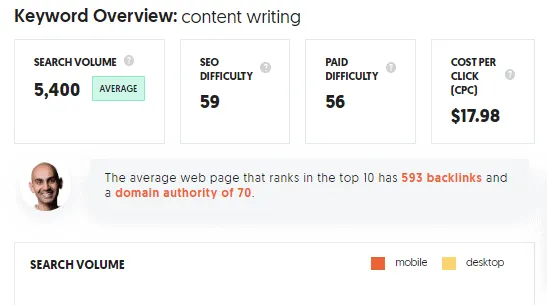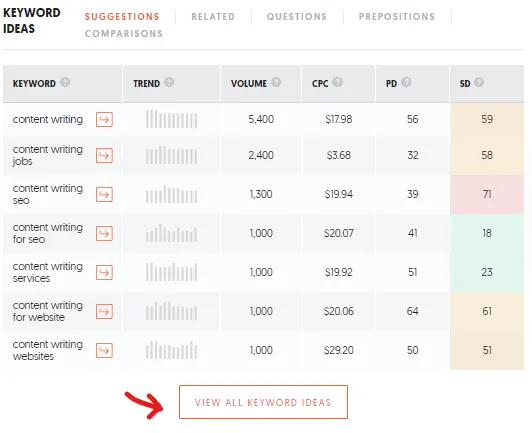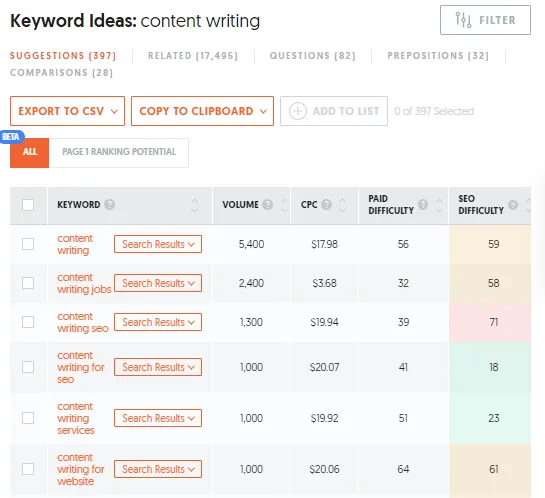How to Write Great Content for a Website: A Simple Guide
If you have a blog or website, you know that having quality content is essential. If you’re just starting out, however, you might feel a bit paralyzed by the flood of information out there about content writing. I have good news for you: the basic ideas are actually really simple and can be boiled down to two things:
You’re writing for people, not algorithms
…But the algorithms are watching
I’m going to unpack both of these ideas below into simple, actionable steps you can take to write great content for your blog or website.
Here’s what we’ll cover:
- Great content is on target
- Great content scratches the itch
- Great content is original
- Great content is readable
- Great content is SEO-friendly
- Conclusion
You’re Writing for People (not algorithms)
This can’t be stressed enough. Your goal when you are writing should be to create content that you would want to read. Many people want to know the “tricks” for making their content rank higher in search results. The reality, though, is that quality is the most important factor Google uses to rank content. (More on this below.) If you want your content to do well, there’s no trick. You just have to create really great content.
So what makes content great? Great content has 4 features:
- Great content is on target
- Great content scratches the itch
- Great content is original
- Great content is readable
Let’s look at each in a little detail.
1. Great Content Is on Target
You can’t hit a target if you aren’t aiming at one. The first thing you need to do, then, is to get clear about the purpose of your writing. Exactly what do you want to say? To whom do you want to say it?
Think about this from the point of view of the user. When you do a search and click on a site, you arrive with a very definite problem or question in mind. What you hope is that your first click leads you to a page that clearly addresses whatever that problem or question is. This is what you want to accomplish for visitors to your site.
How do you do this? It requires some research and also some creative thought.
Keyword Research
The things people enter into search boxes are called keywords and they are incredibly useful to give you insight into what people are actually looking for. There are many great tools out there that you can use to analyze keyword data to make sure your content has an audience and that your content is tailored to that audience’s needs.
Let’s look at an example. For this article, I knew I wanted to write a how-to about content writing. I went to Ubersuggest and typed in “content writing.” Here’s what I saw:

In an overview for a keyword, you see several pieces of helpful information. Search volume is how often the term is searched for in a month (for the United States). SEO difficulty indicates how competitive the term is in organic search results. This score is out of 100 (100 being most difficult) and gives you a sense of how many other people out there are writing content targeted to this term. Don’t worry if you aren’t sure what ‘SEO’ means. We’ll cover that later.
Paid difficulty indicates the competition for paid ads for this term. Cost per click is the average amount you’d have to pay Google per click for an ad targeting this keyword.
Below that, next to Neil Patel’s smiling face, is information about backlinks and authority. Backlinks are links to a page from another website. Domain authority is a score (again, out of 100) that tries to capture how well-regarded the website is by Google’s algorithms. An authoritative site is just what it sounds like: a site that is considered more trustworthy on a particular topic and therefore more likely to be ranked higher in search results.
Based upon this quick search and a little common sense, you can see that writing an article targeting the keyword “content writing” is not a good idea. For one thing, competitors for this keyword have a lot of authority and backlinks. That means my article would likely be deeply buried in search results where no one is going to read it.
Moreover, “content writing” is just too broad. What is someone who types in this search term actually looking for? A definition of the term? Instructions on how to do it? Someone to hire to do it for him or her? We don’t know. If we don’t know, our content is unlikely to be useful to the user who clicks on it.
So we want to try to get more targeted. A great way to do this is to look further down the search results page from Ubersuggest and click on “View All Keyword Ideas.”

That will bring you to a screen like this:

As you can see, this screenshot only captures a bit of the list. There are 397 keywords listed, ranked by search volume. Here is where you identify a more specific topic for a target audience.
Creative Thought
As I looked through the keywords related to content writing, I could see that searchers were clearly interested in different things. This is called “search intent,” and involves a bit of guesswork along with common sense. (Before reading further, try the search yourself and see what you can figure out about search intent.)
There seem to be three main groups: those who are wanting to hire someone to write content, those who are wanting to learn how to write content, and those who want to get jobs writing content.
I am obviously not interested in the first or third groups. I wanted to create an article that addresses the needs of those in the middle: the ones who want to learn about writing content.
Finally, I needed to create a title that both grabs attention and also accurately reflects the content of what I am writing. Again, I want the person who clicks on my link to find exactly what he or she is looking for.
You might wonder about one word in my title: why “overwhelmed”? I reasoned that most of those who wanted to learn how to write web content would be new to the whole thing. Maybe they just set up a blog or started some other kind of website.
The learning curve when you begin is really steep. There is a tremendous amount to learn and a seemingly infinite number of places to read about it. I want that person to see my title, resonate with it, and feel relief at the promise of a guide that can make content writing simple. My title reflects my goal: to help the reader grasp the main ideas needed to create great content as simply as possible.
If you go through this same thinking process when you write, you are going to be writing on target.
2. Great Content Scratches the Itch
The idea here is simple. Once you have made sure your content is targeting a particular audience, you want to ensure that it solves the problem or answers the question of that audience. Otherwise, your content is a waste of time.
You want the person who clicks on your link to leave your page feeling satisfied. Your content has to actually deliver on what you set out to do. You should aim to do this as well as possible.
It is worth bearing in mind that you don’t have a lot of time to show readers that your content is what they are looking for. Within about 10 seconds, they will either conclude your content is worth their time — and keep reading— or move on to one of your competitors.
3. Great Content Is Original
No matter what topic you write on, you’re unlikely to be the only person writing about it. In fact, there are likely to be 100’s of other posts addressing the same content. (It is still morning as I am writing this and there have been over 3,000,000 blog posts already written today.) Make your content stand out.
Obviously, you cannot be totally unique in what you say. You can, however, say it in your own unique way. You bring your own personality, style, and insights. There is also usually room to say something more clearly or more comprehensively.
4. Great Content is Readable
When you are reading a novel that is well-written, your awareness of the writing itself tends to disappear as you become immersed in the story. But maybe you’ve had the experience of reading a poorly-written novel. You trip over words, have to back up and read things again, and get lost.
This same dynamic is present in writing web content. You don’t want the writing to get in the way of the reader’s immersion in the content. This requires paying careful attention to style, structure, and mechanics.
Style
There is a lot that could be said about style. If you are looking for a great book that will make you a better writer, check out the classic: The Elements of Style. You don’t, however, have to be an expert. Just keep a few points in mind.
First, it is usually best to write in an informal, conversational style. I know your teachers in school told you not to use ‘I,’ but they’re not grading your content. Make it personal and connect with your reader.
Second, keep it relatively simple. Avoid complex sentences and technical jargon. People often skim and read quickly when it comes to web content. If they have to labor to read what you’ve written, they’ll move on.
Finally, write in the active voice. Say, “Well-written headlines get clicks” not “Clicks are gotten by well-written headlines.”
Structure
What I have in mind here is the logical structure of what you write. You should begin with a clear outline that lays out what you want to say in an orderly manner. Use an introduction that allows your reader to easily grasp exactly what you are going to be covering and the basic outline of how you’ll be covering it. Make sure your headings actually correspond to what is written after them.
Clarity is your goal here. You may have lots of great information, but if it isn’t organized well, your reader is going to struggle to put it all together.
Mechanics
There are two separate aspects to think about here. First, make sure your writing is free from spelling errors and problems with your grammar. Spell check and programs like Grammarly help with this, but they won’t catch everything. There is no substitute for careful proofreading.
You also want to think about how your content appears visually on the page. Use a readable font at a comfortable size. Make use of headings to divide your text and make it easily scannable. If you write something longish, consider using a table of contents with links for navigation.
…But the algorithms are watching: Writing for SEO
If you give attention to all of the points above, you should be able to write solid, quality content. Remember, that’s the most important thing. After all, you are writing for people and people like to read good content that solves their problems and answers their questions.
And yet those people are only going to find your content if it shows up in their searches. For this reason, we need to think a bit about search engine optimization, or SEO.
In basic terms, SEO is the process of making sure you have done what you can to help search engines find your content and put it before those to whom it is relevant. Most searching happens on Google, so that’s where we are going to focus our attention.
It is helpful to understand how Google ranks pages. Though it may use as many as 200 factors, two are most important:
- Relevance: Google wants to make sure the results it shows are the best possible match for the search intent of the person searching.
- Authority: Some pages (and domains) are more reputable than others. Google wants to make sure the results it shows are the ones most likely to contain reliable information. When you search for “lung cancer” you are going to get results from places like the Mayo Clinic and not your grandma’s blog about home remedies.
How do Google’s algorithms decide what is relevant? By looking at the content of your page. How do they decide if your page has authority? By considering who is linking to your page. A link is sort of like a vote from someone else that your content is worthwhile. Not all votes are equal, however. Links from domains that have greater authority count for more.
What can you do, then, to help Google find your content and present it to your intended audience? I am repeating myself here, but the most important thing again is writing great content. It will be relevant and people will find it useful and naturally want to link to it. (There are more active strategies for building backlinks, but that’s a topic for another post.)
It is also important, however, to help Google out by paying attention to a few details that make your pages SEO friendly.
Mind your tags
When Google crawls your webpage, it pays particular attention to your title and meta description tags. The title is most important, since it (hopefully) captures what your content is about and also shows up in search results.
You also want to make sure your title shows up in the page url. Depending upon the content management system you are using, the default page-naming behavior may need some adjusting. In WordPress, for instance, the default behavior is to assign a number as the title of a new page. Change this setting in settings —> permalinks. You’ll want to select the option “post name”, which will put your title, separated by dashes, into the url.
The meta description gives Google a bit fuller idea of what your page’s content is. Make it clear, concise, and complete. Snippets that show up in search results are sometimes taken from the meta description. For more from Google about these tags and how they are used, see Google Search Central.
Use links
I already mentioned the importance of incoming links to your content. It is also to your advantage, however, to use outgoing links within your page. These come in two flavors: internal and external.
Internal links point to other content within your domain. These links are another way to help Google’s algorithms determine what your content is really about and how your site is structured. According to Semrush, they also can pass authority from your more authoritative pages to newer pages.
External links point to pages outside your domain. These links function in a similar way. They help form the web of connections that clarifies what your content is about. It also helps the authority of your content by linking to reputable sites.
Pay attention to keywords
We discussed keywords above. These are the search terms you are targeting with your content. In the distant past, stuffing these in as much as possible helped page ranking. Now it appears spammy to search engines and will hurt you.
Your keywords should appear in your content in a way that is natural, not forced. It is particularly helpful, though, to have keywords in your title, meta description, and first paragraph. If you are writing content that is relevant to your keywords, this should largely take care of itself.
“Relevant” is important here. In addition to your keywords, Google’s algorithms are looking for lots of other words and phrases that tend to appear in content about your topic. Again, that helps Google figure out what your post is about and whether you are covering it thoroughly. A tool like Surfer SEO can take the guesswork out of this part of the process by helping you make sure you include all the words and topics that will make your post competitive with other high-ranking pages on the same topic.
I
Conclusion
I started out by claiming that you only need to keep two things in mind to succeed in content writing for websites:
You’re writing for people, not algorithms
…But the algorithms are watching
The most important thing is to write great content that is targeted, satisfies the user, is original, and is readable. Quality is king. Write something that you would want to find when you clicked on search results.
We also want to pay attention, though, to how Google decides what to show in search results. Getting a few details right maximizes your chances of being read, appreciated, and linked to.
Follow the tips for content writing discussed above and you’ll be off to a solid start.
What do you think is the most important thing for quality content? Let me know




I recently started my own website and have been struggling with creating engaging and relevant content. This guide has been a lifesaver for me. It’s well-structured, easy to understand and most importantly, actionable. I particularly liked the part about researching your target audience and their needs, this is crucial for creating content that resonates with them. Thank you for putting this together, I will definitely be using it to improve my content writing.